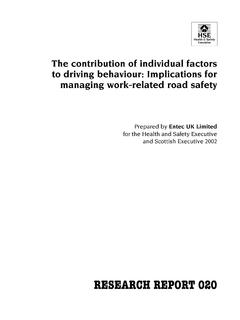Transcription of LGA consultation response - futureofadultsocialcare.co.uk
1 The lives we want to leadFindings, implications and recommendations on the LGA green paper for adult social care and wellbeingLGA consultation responseNovember 2018 ADULT social CAREFUTURE OFContentsForeword ..4 Executive summary: findings and implications ..7 Prioritised recommendations ..12 The LGA green paper consultationAn overview ..15 The findings ..17 AnnexA: List of questions asked by document type ..68B: Sounding Board discussion summary and membership ..734 | The lives we want to leadWhen the Government announced on 18 June 2018 that there would be a further delay to its green paper on the future of social care it created an unwelcome void.
2 A little over a month later, we filled it with our own green paper, 'The lives we want to lead'. We undertook this consultation process because we could not wait any longer for a nationwide debate about how best to fund the care we want to see in all our communities for adults of all ages, and how our wider care and health system can be better geared towards supporting and improving people s wellbeing. The response has exceeded our expectations. We have received more than 500 submissions to our consultation questions from across the general public, people who use services, councils and other interested and significant organisations and sectors.
3 These, alongside other work we have undertaken as part of this process, provide an invaluable and rich source of views and insights and we are extremely grateful to everyone who has given their time to respond so thoroughly. What shines through most in the full range of responses is the level of passion for supporting and improving people s wellbeing and the role social care and other linked services can, and should, play in enabling people to live the lives they want to lead. Twenty years of failed or aborted attempts at reforming social care funding may have frustrated people, but it has quite evidently not dulled their enthusiasm for bringing about what that change might look like from the Government s perspective will be in its forthcoming green paper.
4 We believe our own provides a strong blueprint. And we insist that the views of the more than 500 respondents to our green paper must be reflected in the Government s green paper. This is not to say that the Government s task is suddenly an easy one the weight of previous failed attempts to reform social care funding by governments of all colours will no doubt sit heavily. But there are two key lessons that the Government can take away from the work we have done over the last four and half months and which, at the very least, should focus its , there is clear consensus on key elements of the debate.
5 Most importantly, there is universal agreement that the current situation is unsustainable and, in turn, is failing people on a daily basis, with people not living their life to the full. For those of us without care and support needs, we would not countenance any impediment to living the lives we want to lead; for people with care and support needs, this is the situation they might perhaps explain another point of clear consensus: that adult social care matters. It is a service that supports, fulfils and enables all aspects of a person s life. In this way, it must not be considered within Whitehall, or anywhere else, as a service that primarily helps keep pressure off the NHS or one that can simply be propped up through piecemeal handouts.
6 It is of course true that a sustainable NHS relies on Foreword LGA consultation response | 5a sustainable social care system, but its value is far deeper, and goes far beyond, the impact it has on other public services. If, as a society, we are committed to the ideals of equality of opportunity and self-determination, then we must get serious about adult social , in addition to clear elements of consensus, there is an equally important element of willingness running through the debate. Willingness to engage with the questions that need to be posed and, most crucially, willingness to support or, just as important, accept the type of solutions that are needed to secure social care, but which may hitherto have been considered politically unpalatable or inexpedient.
7 Willingness is a powerful force in this sense and one that the Government must, at the very least, explore further. As the sector and the public begin to coalesce around an understanding that fundamental solutions are needed such as national tax rises or a comprehensive social insurance solution they will simply not accept a roadmap for change that dodges the difficult questions, let alone the difficult decisions. Consensus and willingness are key foundations for change. But they can only go so far in shaping a more detailed picture of what the problems are and how they can be overcome.
8 Responses to our green paper consultation , and other associated work we have conducted as part of the process, help provide this detail. In this respect, we believe this publication should be required reading for the highest parts of Government. But we have not wanted to settle for simply reporting back what others have said, as hugely valuable as that is. Instead, we have carefully reflected on that vital input to draw up a set of recommendations. In some cases, we are revisiting previous positions, albeit with a new and compelling body of evidence behind us. In other cases, we are setting out new positions driven, in part, by a strong desire to try and move the debate along by backing particular solutions to the more thorny issues.
9 This represents an important step change in the Local Government Association (LGA) position and one we hope the Government will mirror. The recommendations we have made are aimed at achieving two broad objectives: stabilising and sustaining the here and now; and moving towards a system that we know could be better. Better in this sense, is not about doing more of what we are doing now, but moving toward the real purpose and intent of the Care Act. This is not a perfect piece of legislation no legislation is. But its principles are fundamentally sound: a genuine focus on people and their wellbeing being at the heart of care and support; a real commitment to prevention and doing everything possible to keeping people fit and well at home; meeting all needs with quality services, delivered by a thriving provider market and skilled and motivated workforce; and effective partnership working not just with the NHS, but with housing, and the voluntary and community sector, for instance.
10 This is about being better, not aspiring to be better, and we know councils can | The lives we want to leadThere is therefore no interest in Government simply rearticulating the problem; we and many countless others have done that. Now is the time for answers. And every day that is spent further defining the problem and consulting on changes that only really tinker at the edges of the debate, is another day in which people s lives are not being lived to the are remembered for the big things they do which improve our society. But sometimes such improvements require wider political buy-in from across all parties, as well as engagement from society at large.








